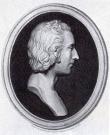Thomas Muir was born in Glasgow in 1765, the only son of James Muir and Margaret Smith.The senior Muir was a successful businessman, launching his career in a small shop in Glasgow and proceeded to acquire ownership of the regal property of Huntershill House in the 1780's. Thomas was formally educated and raised in the moral and ethical confines of the Calvinism faith, these teachings significantly influencing his later political writings.
At age 10, Muir attended classes at Glasgow University and proceeded to graduate with a M.A. in 1782. Muir continued to study law at this university while also becoming increasingly involved in campus political debates. In 1784, claims over the inappropriate spending of university funds involving one of Muir's instructors prompted the young man to seek voluntary self-expulsion. He was granted expulsion and soon enrolled at Edinburgh University where he completed his studies in 1787.
Having gained notoriety from his role in the aforementioned dispute at Glasgow University, Muir became involved in a high-profile cases and gained a reputation as a upstanding lawyer of great moral and ethical fiber. With the outbreak of the French Revolution in 1789, calls for political and parliamentary reform were gaining traction throughout the British Isles and Muir was becoming increasingly involved in this movement. He joined a number of reformist organisations, the "Scottish Association" being the most notable, and became a prominent political figure.
Muir's advocacy for political reform drew attention from the British authorities. He had risen to the position of vice-president in the newly formed "Glasgow Society" and was touring and lecturing widely throughout Scotland. The catalyst for his eventual arrest would come following a general convention of societies where he delivered an address from the radical "Society of United Irishmen" that attacked the Union between Scotland and Britain. This address made its way to the authorities who began investigating a means in which to charge him. Muir had also been distributing and lecturing on Thomas Paine's book "The Rights of Man" and it was this act that the authorities were able to arrest him for sedition on January 2, 1793.
After facing interrogation where he refused to answer any questions, Muir was granted bail. He immediately returned to touring the countryside as an advocate of the reform movement. The Whigs, having initially been supportive of the 1789 French Revolution, had grown fearful of this movement. In Paris, the French King was awaiting public execution by revolutionary forces and this event threatened to demoralize the reform cause in the British Isles. Muir made a hurried expedition to Paris in an attempt to negotiate but arrived too late to make any difference. While in France, Muir was labelled as fugitive from justice.
Muir proceeded to journey to Ireland where he met with nationalist leaders. Back in Britain, political tensions were prominent due to the breakout of war with the French Republic. On August 24, 1793, Muir returned to Scotland and was promptly arrested. The proceeding trial was aimed at demoralizing the Scottish reform movement but this ultimately backfired with allegations of jury-packing laid against the government. The authorities took drastic action and sentenced Muir to fourteen years penal transportation to Australia. Muir was among the very first political prisoners to be sent to Australia and this entire ordeal created a martyr out of this figure.
Further trials followed Muir's with four other individuals being charged with similar crimes. These five figures were named the"Scottish Martyrs," and they arrived in Sydney in May, 1794. As political prisoners, Muir and his fellow "Martyrs" were granted certain privileges unavailable to criminal convicts and were able to live in relative comfort. Muir was determined not to spend any more time in the colonies however and instigated a escape plan in February, 1796. He took a small row boat out into Botany Bay where he managed to acquire passage on an American trading-ship.
The ship sailed to the Americas where Muir attempted to secure further passage to France. Letters were sent to the French government in the hopes of obtaining political asylum yet when a reply was not received after a certain time period, Muir boarded a ship bound for Spain. In April, 1797, this ship reached Spain were it was confronted with a British blockade. A skirmish broke out and Muir was seriously wounded in the exchange. While the ship managed to escape and make land, Muir was later taken into custody by the Spanish authorities.
In February, 1798, he was finally released to France where he was warmly welcomed by the government and public. Now disfigured and suffering from his wounds, Muir returned to advocating for reform in the British Isles. He spent this period composing letters to political figures and expressed the desire for the creation of a Scottish Republic. Thomas Muir died suddenly and in obscurity on 26 January, 1799. His death received little notice at the time and was not communicated to the Scottish, Irish and British public until later.
See related entry.
 1708795382615440357.jpg
1708795382615440357.jpg